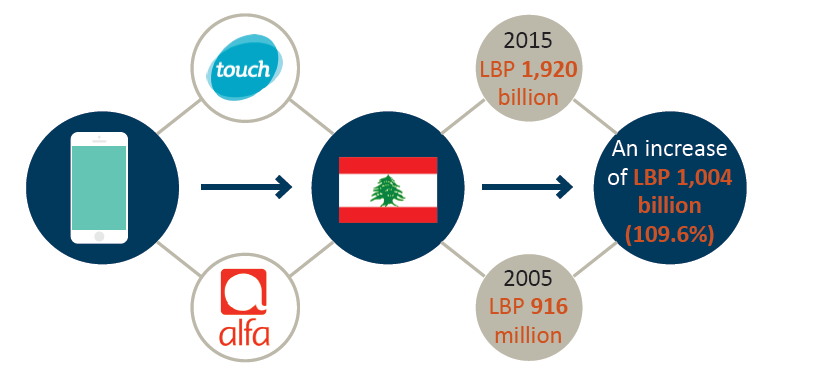Telecommunications sector in Lebanon Annual Revenues of USD 1.3 Billion
Hoping to force the two Lebanese mobile phone operators to reduce the costs of calls, which ranks as some of the highest in the world, as well as with a view to improve the quality of their services, a “Polite Struggle” campaign was waged by some Lebanese citizens to halt cellullar calls on Sunday, January 8th, 2017. This has brought to surface the issue of mobile phones in Lebanon.
The Law and Reality
Law No. 218, issued on May 13th, 1993, authorizes the Ministry of Posts and Telecommunications (currently the Ministry of Telecommunications) to globally call for a tender to establish the GSM Advanced Digital Cellular Radio System project or any other similar project on the basis of BOT, provided that it trains the ministry’s staff in how to manage, operate, and maintain the facilities and equipment. This article of the law is very important, as it allows the ministry to manage the mobile network at the end of the contract. However, in fact, no training has taken place and thus the ministry has not taken full possession of the mobile phone sector.
On February 25th, 1994, the tender went to the two global companies, Telecom Finland (named LibanCell) and France Télécom FTMC (named Cellis), which established the two mobile networks at their own expense and charged the subscribers a fee of USD 500 for buying a phone line. The term of the contract was 10 years, extendable by two more years.
Two years prior to the expiration of the contract, the Lebanese government terminated it on August 2002 and paid an amount of USD 186 million to both companies in compensation for acquiring their assets, provided that they continue to manage the sector on behalf of it until January 31, 2003, and receive a fixed sum in addition to a percentage of total cellullar revenues. Yet, this supposedly temporary situation is still ongoing under the pretext that the government is unable to manage the sector (despite the Law imposing mandatory training for staff in order to handle such a task). A global tender was launched by the government in order to operate the two mobile networks, and the winners were the Kuwaiti company “Zain” (MTC) that manages LibanCell network, and the Egyptian company “Orascom” (Alfa).
Since 2004, the Lebanese government has not reacquired nor reprivatized the mobile phone sector to bring it under its direct management. This is what has led to the current situation and to the poor quality of service in the sector.
The Revenues
According to the 2015 budget bill, the estimated revenues generated from the use of mobile phones are LBP 1,920 billion, compared to LBP 916 million in the 2005 budget bill, i.e. an increase of LBP 1,004 billion (109.6%). This reflects the importance of the mobile phone sector and the revenues it has contributed to the Lebanese government budget. Considering that the two companies are operating the sector on behalf of the government, any decline in revenues due to a boycott such as the "Polite Struggle" will affect the government's budget as well as the companies' revenues.
After all, the matter of reducing the charges, improving the performance, or managing the mobile phone sector remains in the hands of Parliament and the Cabinet.









Leave A Comment